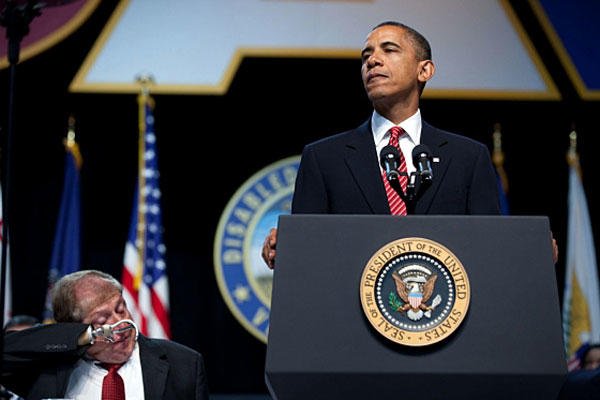ORLANDO, Fla. -- President Obama announced new research initiatives to combat post-traumatic stress disorder and mild traumatic brain injuries while also introducing a joint government-schools effort to help veterans succeed in college.
Obama noted the new initiatives on Saturday during a speech before the Disabled American Veterans annual convention in which he detailed his priorities for veterans, to include a budget that fully funds veterans’ programs, improved healthcare, tackling the claims backlog, veteran homelessness and education.
“That’s what I’m focused on. That’s what I have told my entire administration to be focused on,” Obama said. “That’s what our country needs -- to stay focused for the many years to come.”
Obama highlighted the establishment of two Department of Veterans Affairs and Defense Department consortia with universities to research the diagnosis and treatment of post-traumatic stress disorder and mild traumatic brain injury.
The Consortium to Alleviate PTSD, or CAP, will be made up of the University of Texas Health Science Center in San Antonio, the San Antonio Military Medical Center, and the Boston VA Medical Center. Its mission is to develop the most effective diagnostic, prognostic and rehabilitative strategies to treat acute PTSD and prevent chronic PTSD, according to the VA.
The second effort is the Chronic Effects of Neurotrauma Consortium to be carried out by Virginia Commonwealth University, the Uniformed Services University of the Health Sciences, and the Richmond VA Medical Center.
The CENC will examine the factors that influence the chronic effects of mild TBI and common co-morbidities -- illnesses occurring at the same time -- in order to improve diagnostic and treatment options.
The new education program is called “8 Keys to Success” and will highlight specific ways that colleges and universities can support veterans as they pursue their education and employment goals, according to the White House.
The White House did not release a complete list of the keys, but said they would include providing comprehensive professional development for faculty and staff on issues and challenges unique to veterans and ensuring consistent and sustained support from campus leadership.
The administration so far has commitments from 250 community colleges and universities to aid veterans in completing degree programs, certifications, industry-recognized credentialing and licensing programs that will help them compete for high-skilled jobs.
In his speech, Obama conceded that “we’re not where we need to be, but we’re making progress” in regard to the claims backlog.
“In the last five months alone, it’s down nearly 20 percent. We’re turning the tide,” he said. Obama said the backlog has dropped below 500,000 from a high of 611,000 in March.
Garry Augustine, DAV’s national service director, said the backlog, which has some veterans waiting longer than a year for action on a claim, is the DAV’s top priority. He said he is glad that VA Secretary Eric Shinseki has begun the move of VA records from paper to digital, though he recognizes it is a painful process and regularly puts Shinseki in the line of fire from critics.
The records should have been changed over many years ago, Augustine said.
Obama also raised the issue when he brought up the need to end veteran homelessness, saying veterans have a right to be treated with dignity. He reiterated the VA’s plan to end veteran homelessness by 2015, but said there are other areas to be addressed.





























